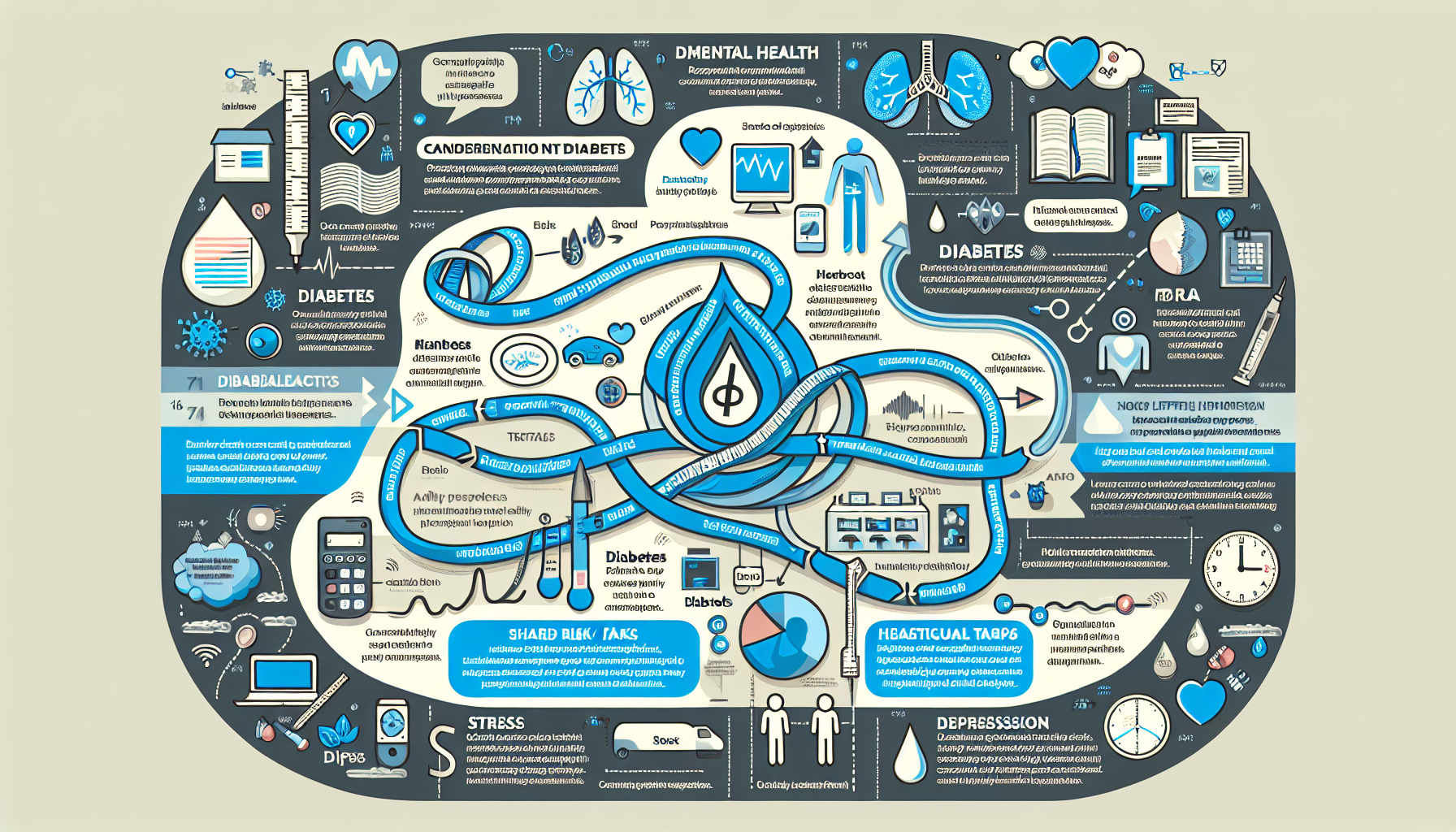Living with diabetes can be a complex and challenging journey, not only physically but also mentally. Recent scientific studies have shed light on the connection between diabetes and mental health, highlighting the significant impact that this chronic condition can have on our emotional well-being. A study published in the Journal of Diabetes and Its Complications found that individuals with diabetes are more likely to experience symptoms of depression. Another study conducted by the American Diabetes Association showed that diabetes is associated with an increased risk of anxiety disorders. These findings emphasize the importance of addressing the mental health aspect of diabetes management, in order to provide holistic care and support for those living with this condition.
Click Here for Proven Fat-Burning Strategies!
Risk Factors for Diabetes and Mental Health Issues
Genetic predisposition
One significant risk factor for both diabetes and mental health issues is genetic predisposition. Studies have shown that having a family history of these conditions increases your likelihood of developing them. For example, a recent study published in the journal Diabetes Care found that individuals with a family history of diabetes were more likely to experience mental health conditions such as depression and anxiety. This suggests that there may be shared genetic factors influencing both diseases.
Obesity and unhealthy lifestyle
Obesity and an unhealthy lifestyle are well-established risk factors for both diabetes and mental health issues. Research has consistently shown a strong association between excess weight, sedentary behavior, and the development of these conditions. A study published in the Journal of Psychiatric Research found that individuals with obesity were more likely to report symptoms of depression and anxiety compared to those within a healthy weight range. Additionally, unhealthy lifestyle choices such as a poor diet and lack of exercise have been linked to increased risk of both diabetes and mental health problems.
Chronic stress
Chronic stress is another significant risk factor for both diabetes and mental health issues. Studies have shown that prolonged stress can have detrimental effects on the body and mind. Chronically elevated levels of stress hormones, such as cortisol, can lead to insulin resistance, which is a key factor in the development of diabetes. Furthermore, research has demonstrated that individuals who experience chronic stress are more likely to develop mental health conditions such as depression and anxiety. A study in the journal Diabetes Research and Clinical Practice found a positive association between stress levels and depressive symptoms in individuals with diabetes.
Uncontrolled blood sugar levels
Uncontrolled blood sugar levels, a hallmark of diabetes, can also have a negative impact on mental health. Studies have shown that consistently high blood sugar levels can lead to cognitive dysfunction and an increased risk of developing mental health disorders. A recent study published in the Journal of Affective Disorders found that individuals with poorly controlled blood sugar levels were more likely to experience symptoms of depression compared to those with better glycemic control. Additionally, fluctuations in blood sugar levels can contribute to mood swings and feelings of irritability.
Biological Mechanisms Linking Diabetes and Mental Health
Inflammation and immune system
Inflammation and immune system dysfunction have been identified as important mechanisms that link diabetes and mental health. Research has shown that chronic inflammation, often present in individuals with diabetes, can also contribute to the development of mental health disorders. A recent study published in the journal Psychoneuroendocrinology found that increased levels of inflammatory markers were associated with symptoms of depression in individuals with diabetes. Furthermore, immune system dysregulation has been observed in both diabetes and mental health conditions, supporting the idea that these diseases may share underlying biological pathways.
Neurotransmitter imbalances
Neurotransmitter imbalances, specifically those involving serotonin and dopamine, have been implicated in both diabetes and mental health disorders. Serotonin is a neurotransmitter involved in regulating mood, while dopamine plays a role in reward and motivation. Studies have shown that individuals with diabetes often have altered levels of these neurotransmitters, which may contribute to the development of mental health disturbances. For example, a study published in the Journal of Diabetes and its Complications found that individuals with diabetes were more likely to have lower levels of serotonin, potentially predisposing them to symptoms of depression.
Hormonal changes
Hormonal changes associated with diabetes can also impact mental health. Insulin, a hormone critical for regulating blood sugar levels, has been shown to play a role in brain function and mood regulation. Research has suggested that insulin resistance, a hallmark of type 2 diabetes, can disrupt the brain’s response to this hormone, leading to mental health disturbances. Additionally, hormonal imbalances involving cortisol, the stress hormone, have been observed in individuals with both diabetes and mental health disorders. These hormonal changes may contribute to the bidirectional relationship between diabetes and mental health.
Effects of insulin resistance on the brain
Insulin resistance, a key feature of type 2 diabetes, can have direct effects on the brain, impacting mental health. Insulin is involved in numerous processes in the brain, including energy metabolism, neurotransmitter regulation, and synaptic plasticity. When the brain becomes resistant to insulin, impairments in these processes can occur, potentially leading to cognitive dysfunction and mental health issues. Recent research published in the journal Current Psychiatry Reports has highlighted the role of insulin resistance in the development and progression of mood disorders such as depression.

Unlock Your Path to a Healthier You!
Effects of Diabetes on Mental Health
Depression and anxiety
Individuals with diabetes are at an increased risk of experiencing depression and anxiety compared to the general population. Several studies have shown a higher prevalence of these mental health conditions among those with diabetes. For instance, a recent study published in the Journal of Affective Disorders found that individuals with type 2 diabetes had almost double the risk of developing depression compared to those without diabetes. Similarly, a review published in the journal Diabetes, Metabolic Syndrome and Obesity: Targets and Therapy found a higher prevalence of anxiety disorders among individuals with diabetes.
Increased risk of cognitive decline
Having diabetes has been associated with an increased risk of cognitive decline and dementia. Research has shown that individuals with diabetes have a higher likelihood of developing conditions such as Alzheimer’s disease and vascular dementia. A study published in the journal Diabetes Care found that individuals with diabetes had a 50-100% increased risk of developing dementia compared to those without diabetes. The mechanisms underlying this association are complex and involve factors such as chronic hyperglycemia, insulin resistance, and cardiovascular risk factors commonly seen in diabetes.
Risk of eating disorders
Individuals with diabetes are also at an increased risk of developing eating disorders. The complex interplay between body image, self-esteem, and the management of diabetes can contribute to the development of disordered eating behaviors. Studies have shown that individuals with type 1 diabetes, in particular, are more vulnerable to the development of eating disorders such as diabulimia, where the individual purposefully manipulates insulin doses to control their weight. A study published in the Journal of Diabetes Science and Technology showed that up to 40% of individuals with type 1 diabetes may have disordered eating patterns.
Impact on sleep quality
Diabetes can have a significant impact on sleep quality, which in turn can affect mental health. Research has shown that individuals with diabetes are more likely to experience sleep disturbances such as insomnia, sleep apnea, and restless legs syndrome. These sleep disorders can contribute to increased levels of fatigue, irritability, and mood disturbances. A recent study published in the journal Sleep Medicine Reviews found that poor sleep quality was associated with greater psychological distress among individuals with diabetes. Improving sleep quality is therefore an essential component of managing both diabetes and mental health.
Effects of Mental Health on Diabetes Management
Lower medication adherence
Mental health issues such as depression and anxiety can have a detrimental effect on medication adherence in individuals with diabetes. It can be challenging to consistently manage a complex treatment regimen when experiencing symptoms such as lack of motivation, low energy, and difficulty concentrating. A study published in the journal Diabetes Care demonstrated that depression was associated with lower adherence to diabetes medications, leading to poorer glycemic control. Recognizing the impact of mental health on medication adherence is crucial for effective diabetes management.
Difficulty in managing blood sugar levels
Mental health issues can make it more challenging to manage blood sugar levels effectively. Symptoms such as lack of motivation, fatigue, and decreased self-care can interfere with regular blood glucose monitoring, healthy eating habits, and appropriate insulin administration. A recent study published in the Journal of Diabetes Investigation found that individuals with comorbid depression and type 2 diabetes had significantly higher HbA1c levels, indicating poorer glycemic control. Addressing mental health concerns is essential for optimizing blood sugar management and reducing the risk of diabetes-related complications.
Emotional eating and unhealthy habits
Individuals with mental health issues may be more prone to emotional eating and the development of unhealthy habits surrounding food and exercise. Emotional eating, often driven by stress, depression, or anxiety, can lead to difficulties in achieving and maintaining a healthy weight. A study published in the journal Appetite found that individuals with comorbid depression and type 2 diabetes were more likely to engage in emotional eating and had poorer dietary quality compared to those without depression. Addressing the emotional and psychological aspects of eating behaviors is crucial for promoting optimal diabetes management.
Increased diabetes-related complications
Mental health issues in individuals with diabetes have been associated with an increased risk of developing diabetes-related complications. The impact of uncontrolled mental health on medication adherence, blood sugar management, and healthy lifestyle behaviors can contribute to the development and progression of complications such as diabetic retinopathy, neuropathy, and cardiovascular disease. A study published in the Journal of Diabetes Science and Technology found that individuals with coexisting depression and diabetes had an increased risk of developing microvascular complications compared to those without depression. Addressing mental health concerns is therefore vital for preventing complications and improving overall diabetes outcomes.

Depression and Diabetes
Prevalence of depression in individuals with diabetes
Depression is highly prevalent among individuals with diabetes. A meta-analysis published in the Journal of the American Medical Association (JAMA) found that individuals with diabetes have approximately twice the risk of developing depression compared to those without diabetes. The prevalence rates varied depending on the type of diabetes, with a higher risk observed in individuals with type 2 diabetes.
Shared risk factors
Depression and diabetes share several risk factors, including genetic predisposition, obesity, and chronic inflammation. The bidirectional relationship between these conditions might arise from shared vulnerabilities and common underlying mechanisms. Understanding the shared risk factors can help inform prevention and intervention strategies that target both diabetes and depression simultaneously.
Potential bidirectional relationship
The relationship between depression and diabetes is bidirectional, meaning that individuals with diabetes are at an increased risk of developing depression, and individuals with depression have a higher risk of developing diabetes. A review article published in the Journal of Diabetes Care explored the potential mechanisms underlying this bidirectional relationship. It proposed that biological mechanisms, behavioral factors, and shared psychosocial vulnerabilities contribute to the interplay between depression and diabetes.
Effect of depression on diabetes outcomes
Depression can have significant consequences for diabetes outcomes, including poor glycemic control, increased healthcare utilization, and higher rates of diabetes-related complications. A study published in the journal Diabetologia found that individuals with diabetes and comorbid depressive symptoms had poorer glycemic control and were more likely to develop macrovascular complications compared to those without depression. Recognizing and addressing depression in individuals with diabetes is crucial for improving both mental health and diabetes management outcomes.
Anxiety and Diabetes
High prevalence of anxiety in individuals with diabetes
Anxiety disorders are highly prevalent among individuals with diabetes. Research has shown that individuals with diabetes are more likely to experience symptoms of anxiety compared to those without diabetes. A study published in the journal Diabetes Care found that individuals with type 2 diabetes had a 20-40% higher risk of developing anxiety disorders compared to the general population.
Impact on glucose control
Anxiety can have a significant impact on glucose control in individuals with diabetes. The physiological and psychological stress response associated with anxiety can lead to increased cortisol levels and changes in insulin sensitivity, ultimately affecting blood sugar levels. A recent study published in the journal Primary Care Diabetes investigated the relationship between anxiety symptoms and HbA1c levels in individuals with type 2 diabetes. It found that higher levels of anxiety were associated with poorer glycemic control.
Role of chronic stress
Chronic stress is closely linked to both diabetes and anxiety. Prolonged stress can dysregulate the hypothalamic-pituitary-adrenal axis, leading to increased cortisol production and a state of chronic hypercortisolemia. This chronic stress and dysregulation of cortisol release may contribute to the development and maintenance of anxiety disorders. A longitudinal study published in the journal Psychoneuroendocrinology found that higher levels of cortisol were associated with a greater risk of developing anxiety disorders in individuals with diabetes.
Importance of anxiety management in diabetes
Effective management of anxiety is crucial for individuals with diabetes to achieve optimal diabetes control and overall well-being. Cognitive-behavioral therapy (CBT) has been shown to be effective in managing symptoms of anxiety in individuals with diabetes. A randomized controlled trial published in the journal Diabetes Care demonstrated that CBT reduced anxiety symptoms and improved diabetes outcomes, including glycemic control and diabetes-related distress. Incorporating anxiety management strategies alongside diabetes management can lead to better long-term outcomes.

Cognitive Decline and Diabetes
Association between diabetes and cognitive impairment
Growing evidence suggests that individuals with diabetes are at an increased risk of cognitive decline and cognitive impairment. Studies have shown that diabetes, particularly type 2 diabetes, is associated with an accelerated decline in cognitive function. A large cohort study published in the journal Diabetes Care found that individuals with type 2 diabetes had a higher risk of developing mild cognitive impairment and dementia compared to those without diabetes.
Increased risk of dementia
Diabetes has been identified as a significant risk factor for the development of dementia, including Alzheimer’s disease. The mechanisms underlying this connection involve both vascular and non-vascular pathways. Chronic hyperglycemia, insulin resistance, oxidative stress, and inflammation are thought to contribute to the increased risk of dementia in individuals with diabetes. A population-based study published in the journal Diabetes Care found that individuals with diabetes had a twofold increased risk of developing dementia compared to those without diabetes.
Impact of chronic hyperglycemia on cognitive functioning
Chronic hyperglycemia, a hallmark of diabetes, can have detrimental effects on cognitive functioning. Elevated blood sugar levels for prolonged periods can lead to oxidative stress and damage to blood vessels in the brain, contributing to cognitive decline. A recent study published in the journal Diabetes found that higher HbA1c levels were associated with poorer cognitive performance in individuals with type 2 diabetes. Optimal diabetes management, including glycemic control, is essential for preserving cognitive function in individuals with diabetes.
Strategies for managing cognitive decline
Managing cognitive decline in individuals with diabetes involves a multifaceted approach. Lifestyle modifications such as regular physical activity, a healthy diet, and cognitive stimulation have been shown to be beneficial in preserving cognitive function. A randomized controlled trial published in the journal The Lancet Diabetes & Endocrinology demonstrated that a multidomain intervention, which included diet, exercise, cognitive training, and vascular risk monitoring, significantly improved cognitive function in individuals with type 2 diabetes. Identifying and addressing cognitive decline early is crucial for optimizing outcomes in individuals with diabetes.
Eating Disorders and Diabetes
Higher prevalence of eating disorders in individuals with diabetes
Individuals with diabetes, particularly type 1 diabetes, are at a higher risk of developing eating disorders compared to the general population. The unique challenges associated with managing diabetes, including the focus on food, body weight, and insulin administration, can contribute to the development of disordered eating behaviors. A systematic review published in the journal Eating Disorders found that individuals with type 1 diabetes had a two to three times higher risk of developing eating disorders compared to those without diabetes.
Connection to body image and self-esteem
The connection between eating disorders and diabetes is often driven by body image concerns and self-esteem issues. The pressure to achieve and maintain a specific body weight, coupled with the fear of complications related to diabetes management, can lead to disordered eating patterns. Studies have shown that dissatisfaction with body image and self-esteem are significant risk factors for the development of eating disorders in individuals with diabetes. A study published in the journal Eating Disorders: The Journal of Treatment and Prevention found that body dissatisfaction was associated with disordered eating behaviors in individuals with type 1 diabetes.
Impact on blood sugar control
Eating disorders can have a profound impact on blood sugar control in individuals with diabetes. Restrictive eating behaviors, purging, and insulin manipulation can lead to wide fluctuations in blood sugar levels, increasing the risk of hypoglycemia and long-term diabetes complications. Research has demonstrated that disordered eating behaviors are associated with poorer glycemic control in individuals with type 1 diabetes. Addressing eating disorders in diabetes management is crucial for optimizing blood sugar control and reducing the risk of complications.
Approaches for addressing eating disorders in diabetes
Addressing eating disorders in individuals with diabetes requires a multidisciplinary approach that involves healthcare professionals specializing in both diabetes management and eating disorder treatment. Psychosocial interventions, including cognitive-behavioral therapy (CBT) and family-based therapy, have shown promise in treating eating disorders in individuals with diabetes. A randomized controlled trial published in the journal Diabetes Care demonstrated that CBT was effective in reducing eating disorder symptoms and improving glycemic control in individuals with type 1 diabetes. Early identification and intervention are crucial for preventing the progression of eating disorders in individuals with diabetes.

Stress and Diabetes
Biological response to stress
Stress triggers a physiological response in the body, commonly known as the “fight-or-flight” response. This response involves the release of stress hormones such as cortisol and adrenaline, increasing heart rate and blood pressure. While acute stress can be beneficial in certain situations, chronic stress can have detrimental effects on health, including diabetes. Research has shown that chronic stress can lead to insulin resistance, an essential factor in the development of type 2 diabetes.
Effects of chronic stress on blood sugar levels
Chronic stress can have significant implications for blood sugar control in individuals with diabetes. Stress hormones, such as cortisol, can lead to increased blood glucose levels by promoting the break down of stored glycogen and inhibiting the action of insulin. Research has demonstrated that chronic stress is associated with poorer glycemic control in individuals with diabetes. A study published in the journal Psychoneuroendocrinology found that individuals with diabetes who reported higher levels of chronic stress had higher HbA1c levels.
Stress management techniques
Effective stress management is crucial for individuals with diabetes to maintain healthy blood sugar levels and overall well-being. Various stress management techniques have been shown to be beneficial in reducing stress levels. These techniques include mindfulness-based stress reduction, relaxation exercises, physical activity, and social support. A systematic review published in the journal Diabetes Spectrum found that interventions targeting stress reduction in individuals with type 2 diabetes led to improvements in glycemic control and psychological well-being.
Importance of support in reducing stress
Having a support system in place is essential for individuals with diabetes to effectively manage stress. Support from family, friends, healthcare professionals, and support groups can provide emotional assistance, practical help, and guidance in developing healthy coping mechanisms. A study published in the journal Diabetes Care found that individuals with social support had lower stress levels and better diabetes self-care behaviors, including medication adherence and blood glucose monitoring. Recognizing the importance of support in reducing stress is vital for individuals with diabetes.
Conclusion
The bidirectional relationship between diabetes and mental health is complex and multifaceted. Genetic predisposition, obesity and unhealthy lifestyle, chronic stress, and uncontrolled blood sugar levels are significant risk factors for both conditions. Inflammatory processes, neurotransmitter imbalances, hormonal changes, and the effects of insulin resistance on the brain contribute to the biological mechanisms linking diabetes and mental health.
The impact of diabetes on mental health includes an increased risk of depression, anxiety, cognitive decline, and eating disorders. Mental health issues can also have a detrimental effect on diabetes management, leading to lower medication adherence, difficulty in managing blood sugar levels, emotional eating, and increased diabetes-related complications.
Recognizing the bidirectional connection between diabetes and mental health is crucial for holistic healthcare. Effective management requires a comprehensive approach that addresses both physical and mental well-being. Promoting mental well-being in diabetes management involves incorporating strategies for stress reduction, anxiety management, and the treatment of depression and eating disorders. Future research should continue to explore the complex relationship and identify further opportunities for intervention and prevention.

